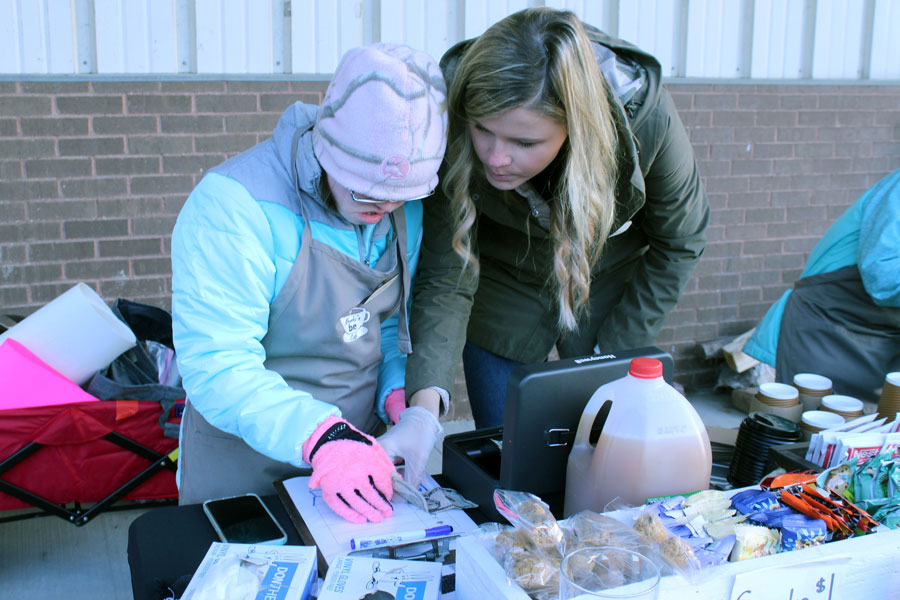Lowell — Every other Wednesday, passersby on M-21 driving through the city of Lowell can buy their morning cup of coffee and support students in the high school’s transition skills class.
Throughout the school year, the students take a van from Lowell High School to Bernard’s Ace Hardware, 1601 W. Main St., with their morning refreshments and set up their remote coffee cart from 8:30 to 10 a.m.
For now, the class has a table outside, but once temperatures truly plummet, the coffee cart will be offered inside the store.
On a recent November morning, sophomore Hayden Videan was thankful he was in charge of the coffee pump dispenser.
“(My favorite part is) pumping the coffee. I’m good at it,” he explained. “And when it’s chilly in the morning, the coffee is nice and warm.”
Added junior Molly Wade: “You have to make sure you ask if they (the customer) want cream or sugar.”
Along with coffee, Hayden, Molly and their classmates offer tea, hot chocolate and student-made power balls made of oats and peanut butter. Customers can sometimes grab a cup of warm apple cider as well.

In-House Transition
The class has so far had no lack of customers in parents, grandparents and even some of the school staff’s adult children who stop by to buy a warm beverage.
“We’ve just received so much support,” said special education teacher Olivia Johnson. “For us to be able to showcase what we’re doing has been amazing.”
At first, the service was just at school, where students delivered drinks to teachers and staff via a cart. But the intention was always to get out into the community and provide opportunities for students to learn vocational skills.
Thanks to a grant from Lake Michigan Credit Union and partnerships with Brody’s Be Cafe in Ada and Bernard’s Ace Hardware in Lowell, the public coffee cart became a reality this year.
“We wanted to do an in-house (transition) program in Lowell because there are some great ones offered through (Kent ISD), but they’re offered junior and senior year,” Johnson explained. “We wanted to serve our other students too.”
With initial funding provided through the grant, the coffee cart is now primarily self-sustaining, and any proceeds go directly toward restocking the coffee cart’s supplies.

Building Work Skills
Students who run the coffee cart learn and practice vocational skills they’ll continue to need throughout their lives.
Before students start working at the coffee shop, Allison Butkus, who also teaches classes for students with cognitive impairments at Lowell, guides them through the transitional skills necessary for the workforce, such as working with others, greeting customers, counting cash and more.
Those skills are applied through their work at the coffee cart with the hope they’ll carry what they have learned to their future workplaces.
“We focus on a lot of soft skills,” Johnson said. “The coffee cart really helps students get familiar with counting money, serving customers, stocking supplies and different things like that.”
“(I like) taking the money and giving the change back to people,” added sophomore Zachary Vaughn.
Johnson said that responsibility sometimes includes determining which money goes into the cash box and which goes into the tip jar when a customer pays with a $5 bill for their $2 drink and tells him to keep the change. Students also practice the skills at the high school Spirit Store, where they stock shelves, serve popcorn and perform other concession stand duties.









